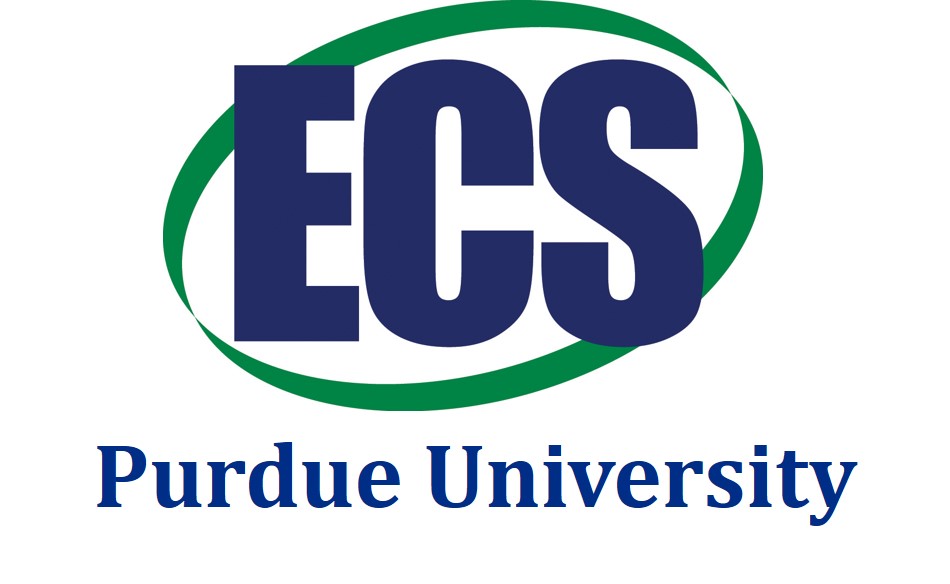Dr. Stephen J. Harris talk on 10/25/2021
Next on the webinar series,
.jpg)
Dr. Stephen J. Harris talk on 10/25/2021
Next on the webinar series,
Dr. Stephen J. Harris, from Lawrence Berkley National Lab, gave a lecture on "Lithium
Contact Mechanics and Preventing Dendrite Penetration into Solid Electrolytes".
He introduced a concept, new to the battery field, for preventing penetration of
lithium dendrites through SEs by putting the SE surfaces into a state of residual
compressive stress. For a sufficiently high compressive stress, cracks have difficulty
forming, and cracks that do form are forced to close, inhibiting dendrite penetration.
This approach is widely used to solve commercially important stress corrosion cracking
problems in metals and static fatigue problems in ceramics and glasses (e.g., Gorilla Glass).
However, Dr. Harris emphasized that the technique will not be useful for SEs if the Li-ion
transport rate through a SE is substantially reduced when the SE is under compression.
.jpg)
Dr. Yui Qi talk on 10/18/2021
Next on the Fall '21 webinar series,
Dr. Yui Qi, from Brown University, gave a talk on "When ions meet electrons ---
Modeling the Interfaces in Solid-State Batteries". She highlighted that one challenge
for solid-state batteries is the high interfacial resistance, due to two main factors:
physical contact and chemical effect. This new physics insight unified the seemingly
contradictory experimental observations and led to new device design rules to promote
interfacial ion transport in future solid-state batteries. Another challenge for high
energy density solid-state barriers using Li-metal electrodes is the soft Li dendrite
growth inside the hard solid electrolytes. These modeling advancements will be integrated
into a new framework to guide the development of all-solid-state Li-ion batteries.

Dr. Matthew T. McDowell talk on 09/27/2021
Next on the webinar series,
Dr. Matthew T. McDowell, Assistant Professor at Georgia Institute of Technology, gave a
lecture on "Understanding the Evolution of Materials and Interfaces in Solid-State Batteries".
Dr. McDowell presented on the understanding of the key differences
between how high-capacity anode materials behave in solid-state batteries compared to
in conventional liquid-electrolyte batteries. The electro-chemo-mechanical evolution
of materials at solid-solid electrochemical interfaces is different than at solid/liquid
interfaces, and contact evolution in particular plays a critical role in determining the
behavior of solid-state batteries. Taken together, Dr. McDowell highlighted that these
findings show the importance of controlling chemo-mechanics and interfaces in solid-state
batteries for improved energy storage capabilities.
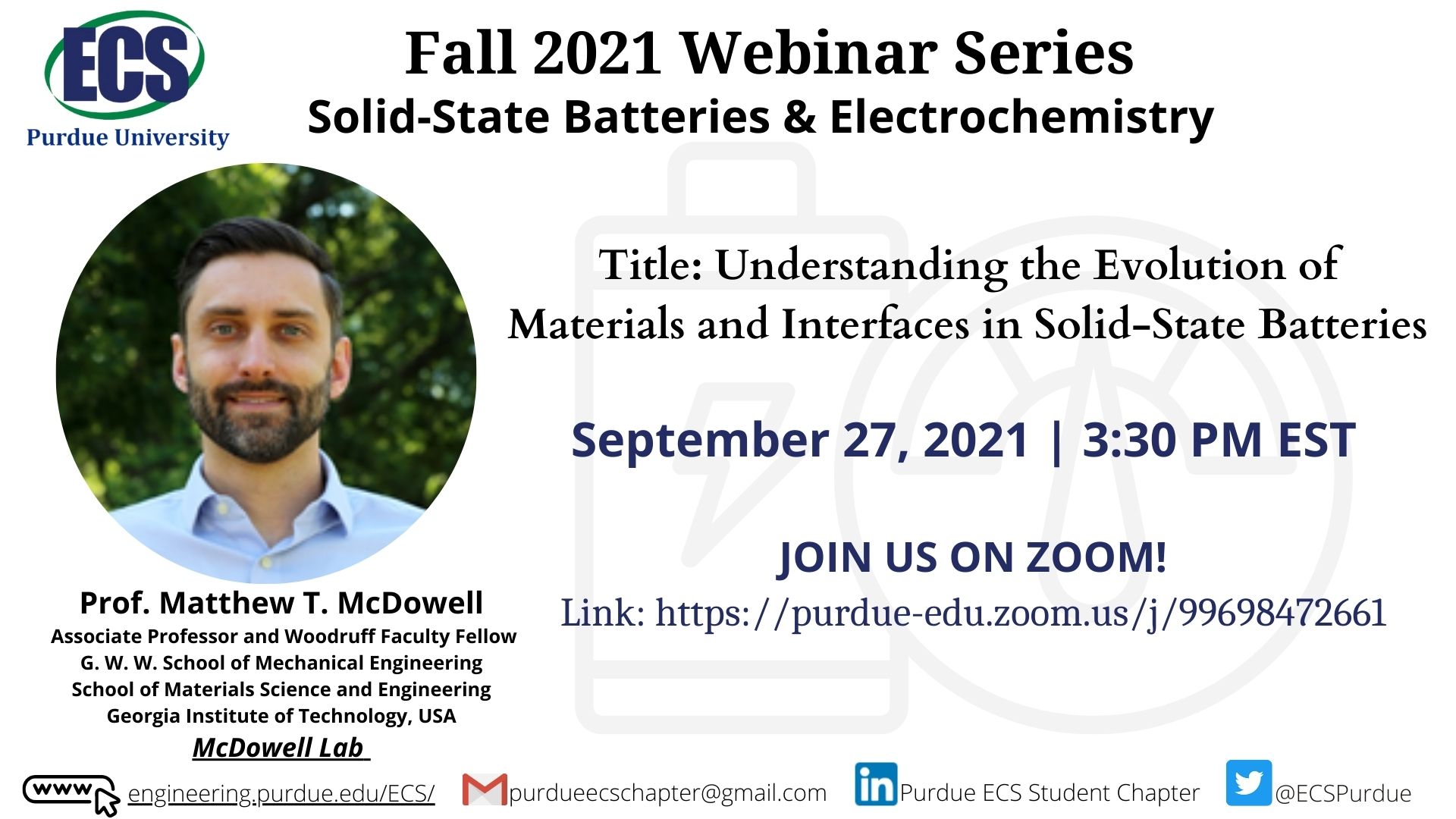
Dr. Neil Dasgupta talk on 09/20/2021
To being the Fall 2021 Webinar
Series on Solid-State Batteries & Electrochemistry, Dr. Neil Dasgupta, Assistant
Professor from the University of Michigan, gave a talk on "Multi-modal Operando Analysis
of Solid-State Batteries". In this talk, Dr, Dasgupta presented a suite of multi-modal
in-situ/operando characterization approaches that we have used to study Li metal-solid
electrolyte interfaces during cycling. First, to gain an improved understanding of the
electrochemical stability, he discussed operando X-ray photoelectron spectroscopy (XPS)
analysis of lithium metal-solid electrolyte interfaces. A range of sulfide and oxide
ceramic electrolytes were explored, since they exhibit a range of (in)stability levels
during Li metal plating.
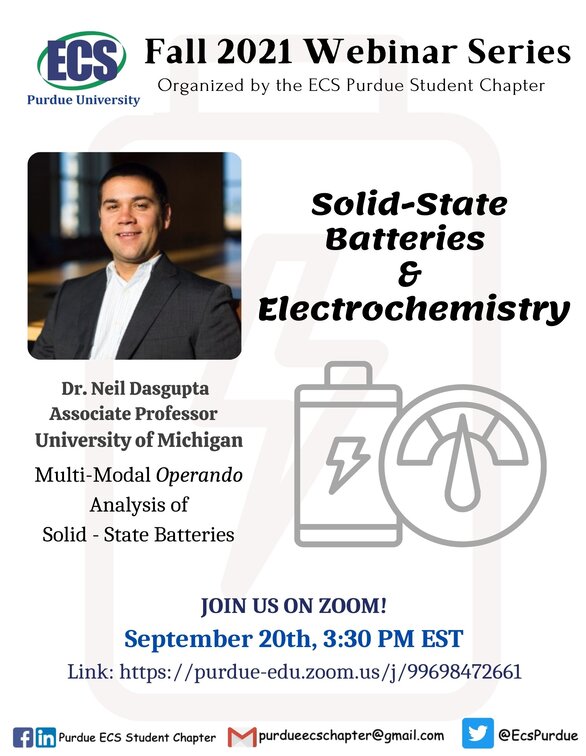
Concluding Symposium of the Webinar Series on 05/24/2021
To conclude
the Spring 2021 Woman in Electrochemical Sciences and Engineering (WIESE) Webinar Series,
Dr. Amy L. Prieto, Dr. Lakshmi Krishnan and Dr. Judy Jeevarajan joined for a symposyum on
"Prospects and Translation of Electrochemistry Research in Materials, Processes and Systems
in Energy Storage & Conversion".

Dr. Rajeswari Chandrasekaran talk on 05/10/2021
Next on the webinar series,
Dr. Rajeswari Chandrasekaran, from the R&D department at Enovix, gave a lecture on "High
Energy Density Enovix Lithium-ion Cells with Silicon Negative Electrode". Dr. Chandrasekaran
gave a brief overview of the technical evolution of the company Enovix, the research efforts
of which are devoted to the design and development of energy-dense lithium-ion batteries
based on silicon anode technology. The current feature involves a 3D cell architecture and
boasts of superior energy density than what the baseline market has to offer. She revealed
how the typical problems plaguing silicon anodes existent in the form of high formation expansion,
low formation efficiency, and cycle life were mitigated by rational engineering solutions.
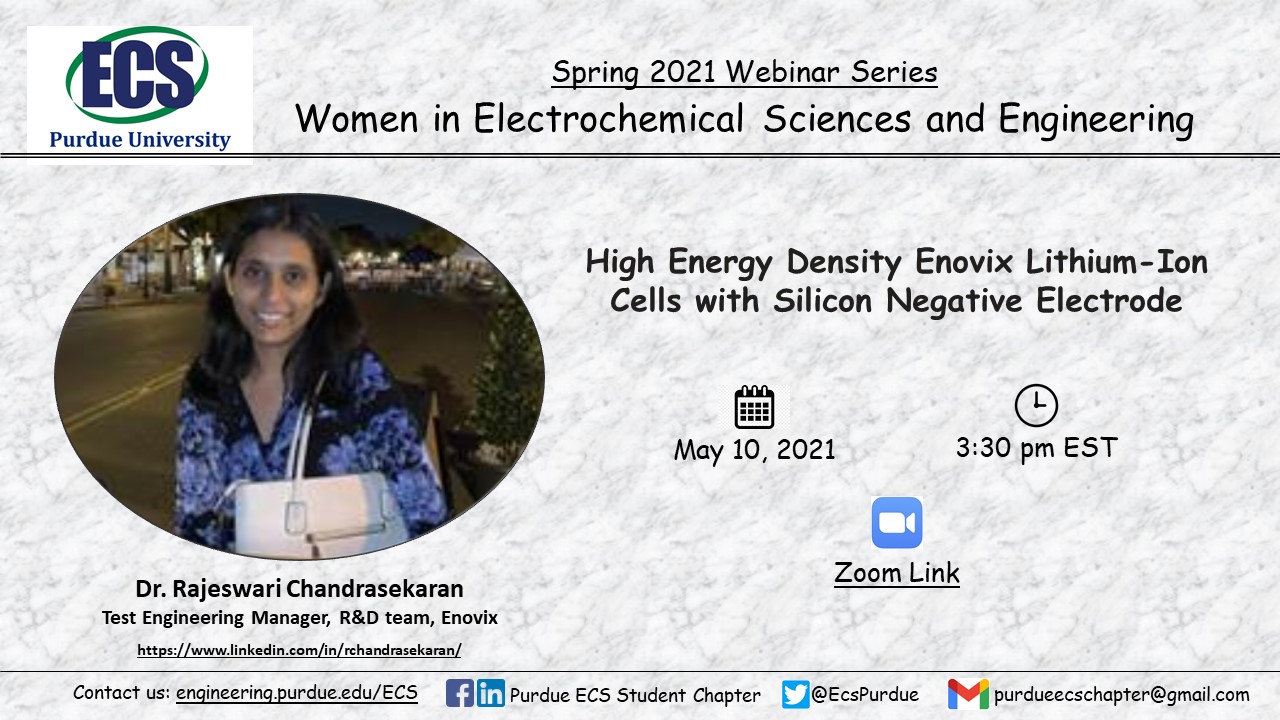
Dr. Kelsey Hatzell talk on 05/05/2021
Next, Dr. Kelsey Hatzell, from
Princeton University gave a talk on "Synchrotron Characterization of Buried Interfaces
in Solid-State Batteries". In this talk, Dr. Hatzell discussed opportunities for tracking
phenomena and mechanisms in all solid-state batteries in situ using advanced synchrotron
techniques. Synchrotron techniques that combine reciprocal and real-space techniques are capable
of tracking multi-scale structural phenomena from the nano- to meso-scale. She also
highlighted the role that microstructure plays on transport and interfacial properties
that govern adhesion. Quantification of salient descriptors of structure in solid-state
batteries is critical for understanding the mechanochemical nature of all solid-state batteries.
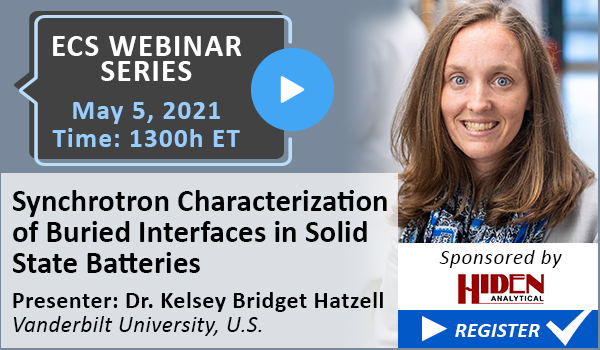
Dr. Hassina Bilheux talk on 04/26/2021
Next on the webinar series was
Dr. Hassina Bilheux from Oak Ridge National Laboratories. Dr. Bilheux gave a talk on
"Scientific Opportunities Enabled by Current and Future Neutron Imaging Capabilities at
ORNL". Dr. Bilheux is interested in applying advanced imaging techniques in the fields
of materials science (such as energy and additive manufacturing), geosciences and
biological applications at the Spallation Neutron Source VENUS imaging beamline she
is currently building. Dr. Bilheux went into the details of developing advanced
reconstruction and data analysis tools for hyperspectral (i.e., multiple wavelengths)
computed tomography at both neutron and X-ray sources.
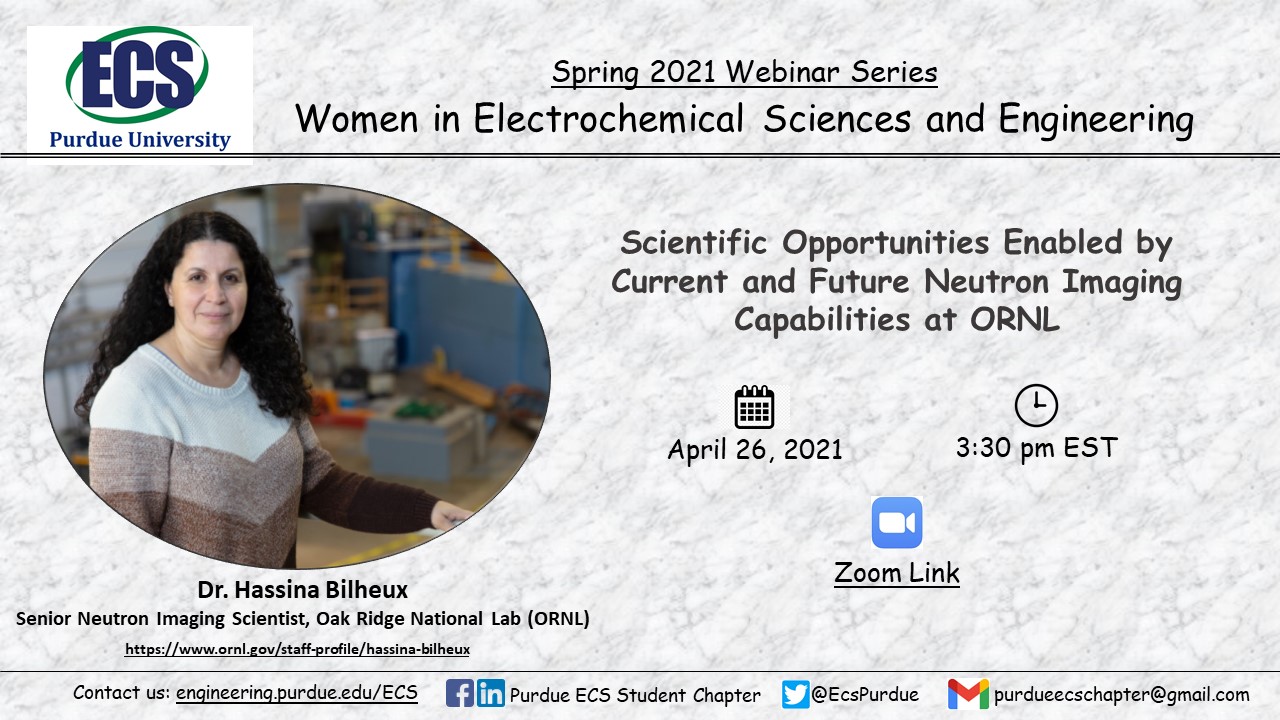
Dr. Rana Mohtadi talk on 04/19/2021
Next on the webinar series, Dr. Rana
Mohtadi, from Toyota Research Institute of North America, gave a talk on "Battery electrolytes:
Key components toward enabling beyond Li-ion batteries". Dr. Mohtadi emphasized the ever-rising
demands for energy dense electrochemical storage systems that has been driving
interests in beyond Li-ion batteries such as those based on lithium and magnesium metals. She
highlighted the challenges that these high energy density batteries suffer, several of which stem
from the flammability/volatility of the electrolytes and/or instability of the electrolytes
with either the negative, positive electrode or both. Dr. Mohtadi also discussed the classes of
hydride-based electrolytes reported for energy dense batteries are discussed. Future perspectives were
presented to guide research directions in this field.
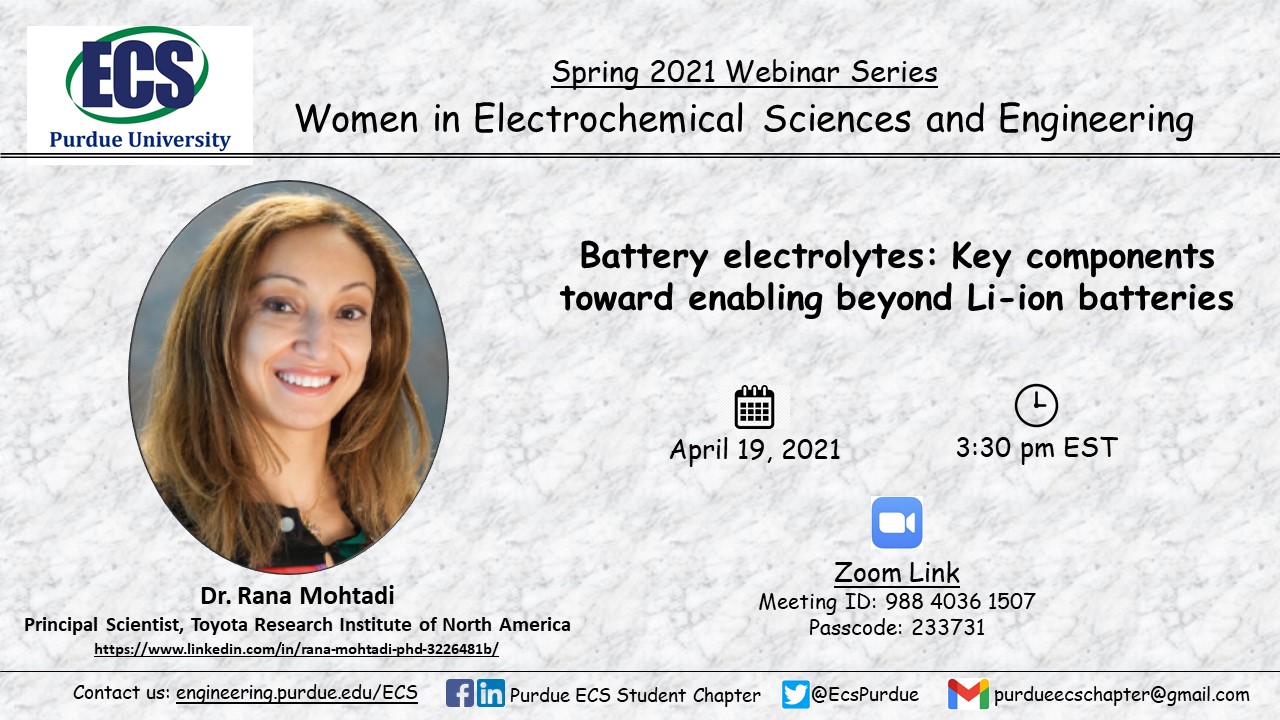
Dr. Veronica Augustyn talk on 04/12/2021
The next speaker was Dr. Veronica
Augustyn, Assistant Professor of Materials Science & Engineering and University Faculty
Scholar at NC State University. She gave a lecture on "Electrochemical Capacitance under
Confinement: Implications for Electrochemical Energy Storage and Conversion". In this
lecture, Dr. Augustyn highlighted the growing need to develop thinner, lighter, and faster
electrochemical energy storage solutions to meet the increasing demands in applications
ranging from storage of renewable energy to powering electric cars and enabling the Internet of Things.
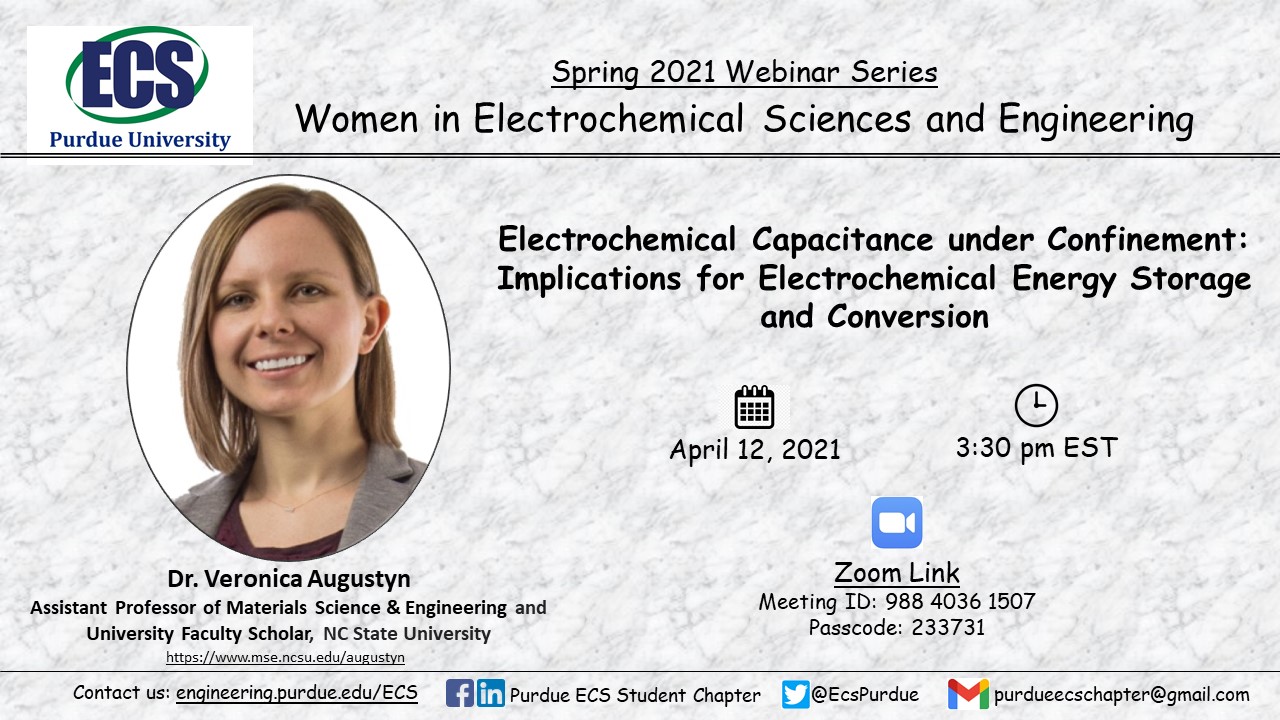
Dr. Nicole Vadivel talk on 04/05/2021
Our next speaker was Dr. Nicole
Vadivel from Form Energy, Inc. In her lecture, Dr. Vadivel highlighted key aspects related
to electrochemical engineering. From her expertise as a battery engineer on
high energy-high voltage lithium-ion batteries including silicon material
technology, she demarcated the innate features of lithium-ion batteries for
usage in an electric vehicle versus a grid application. For the former, the key
attributes include safety, range, cost, volumetric energy density and fast
charging capabilities. She also explained that the weight is not necessarily a
determining factor for application in grid energy storage. She also stressed upon
creating a conducive atmosphere for women electrochemists both on an individual and a
community level by bolstering aspirants to pursue STEM research in addition to creating resource
groups.
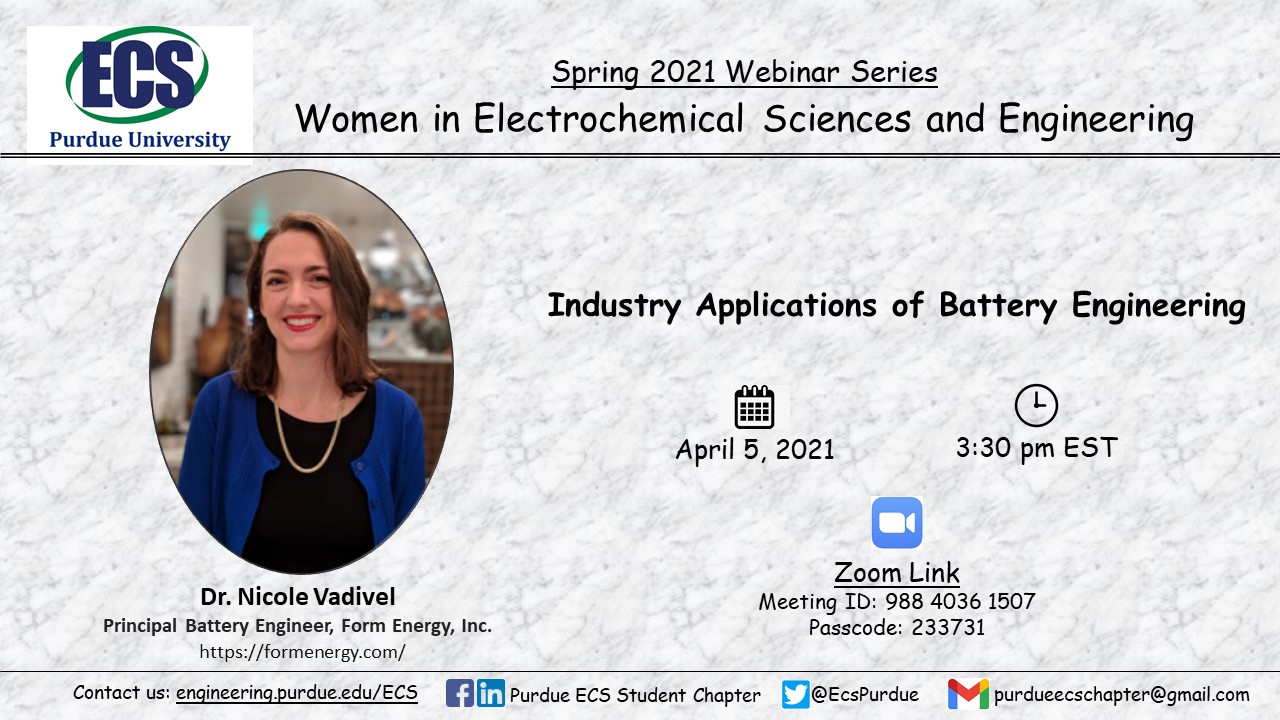
Dr. Nella M. Vargas-Barbosa talk on 03/29/2021
The fifth talk was
given by Dr. Nella Vargas-Barbosa from the IEK-12: Helmholtz Institute Munster on
"A traditional (electro)chemist's journey to working with solid-state batteries".
Dr. Vargas-Barbosa talked about several key details of solid-state batteries such as
electrochemical interfaces, the stability limit of thiophosphate-based solid-electrolytes,
ionic conductivity and activation barriers, and much more. The seminar was divided into
several parts which described her journey as a research scientist.
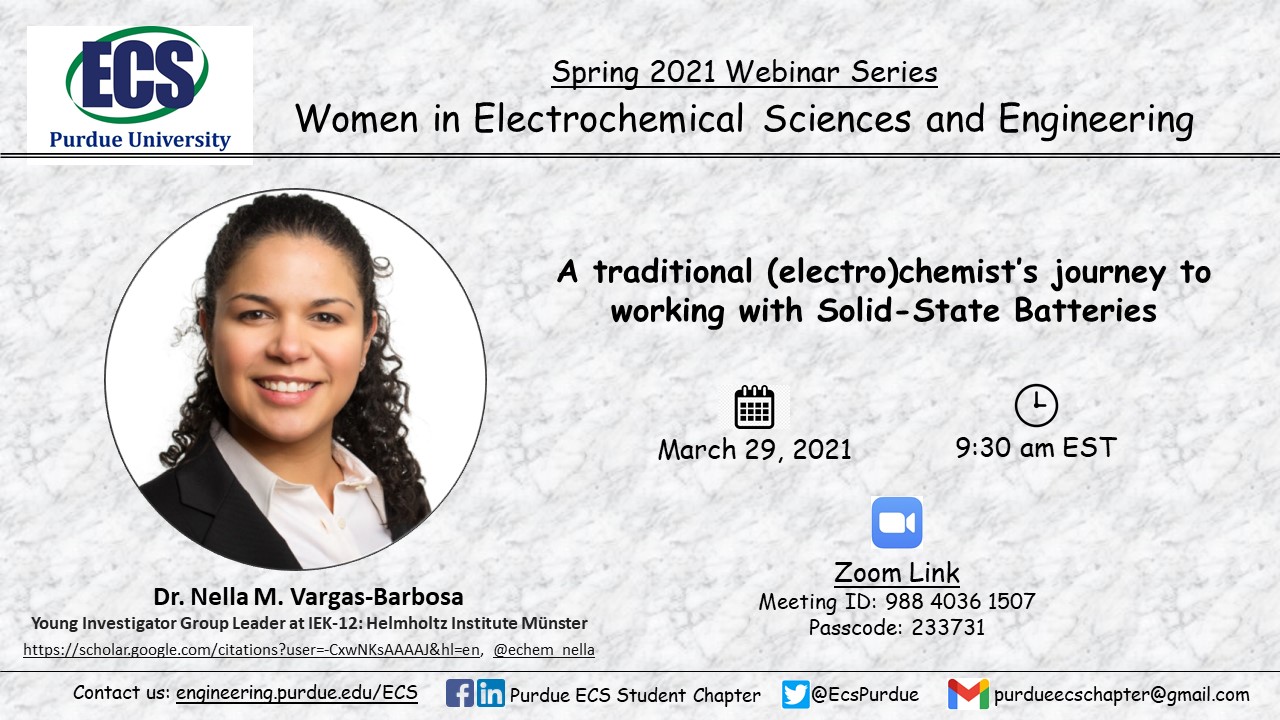
Dr. Katherine L. Harrison talk on 03/22/2021
The fourth talk was
given by Dr. Katherine Harrison from Sandia National Laboratories on "Li metal
anodes cycled in high concentration solvate electrolytes". Dr. Harrison went into
the details of the effects of applied interfacial pressure on Li-metal anode cycling
performance and morphology in the recently developed and highly efficient 4 M
lithium bis(fluorosulfonyl)imide in 1,2-dimethoxyethane electrolyte.
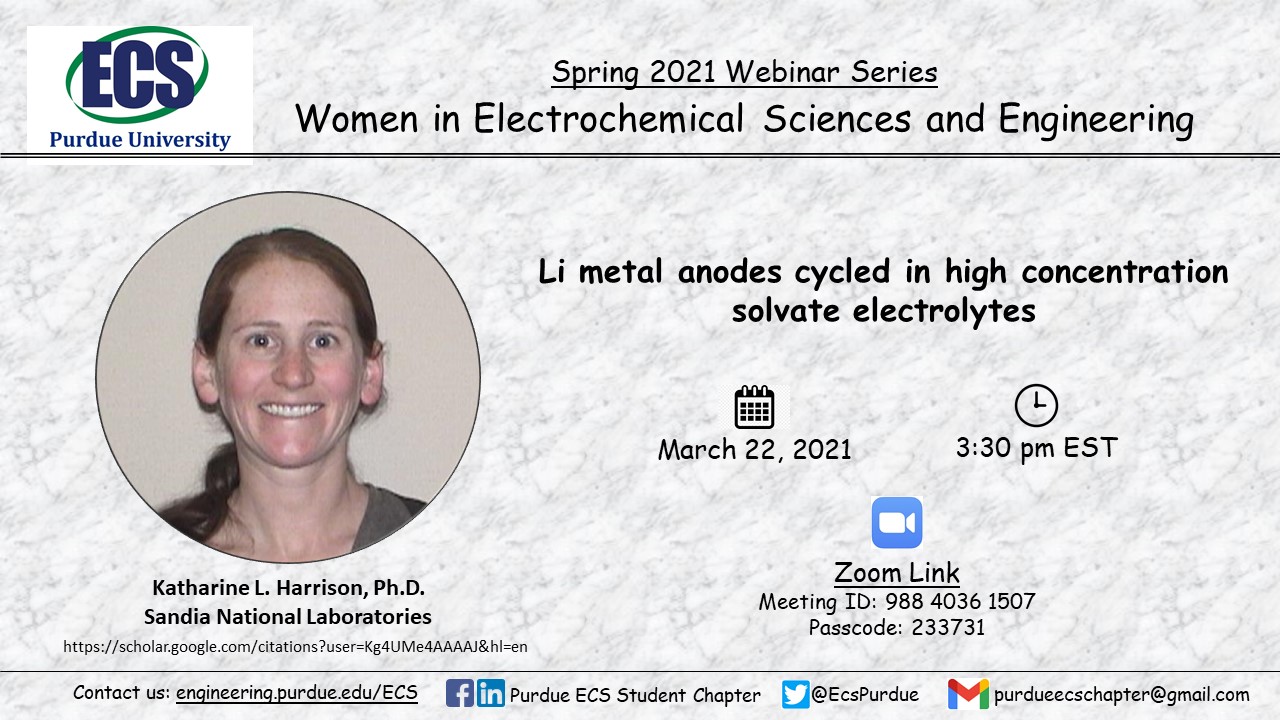
Dr. Johanna N. Weker's talk on 03/08/2021
The fourth talk in the
webinar series was given by Dr. Johanna N. Weker on "X-ray characterization of
batteries in action: Morphology, Microstructure, & Chemistry". Dr. Weker talked
about how in energy storage, in situ X-ray imaging of electrode particles is providing
important insight into degradation processes. She mentioned how recently, both
spatial and temporal resolutions are improving to a few nm and milliseconds and
these developments will open up unprecedented opportunities.
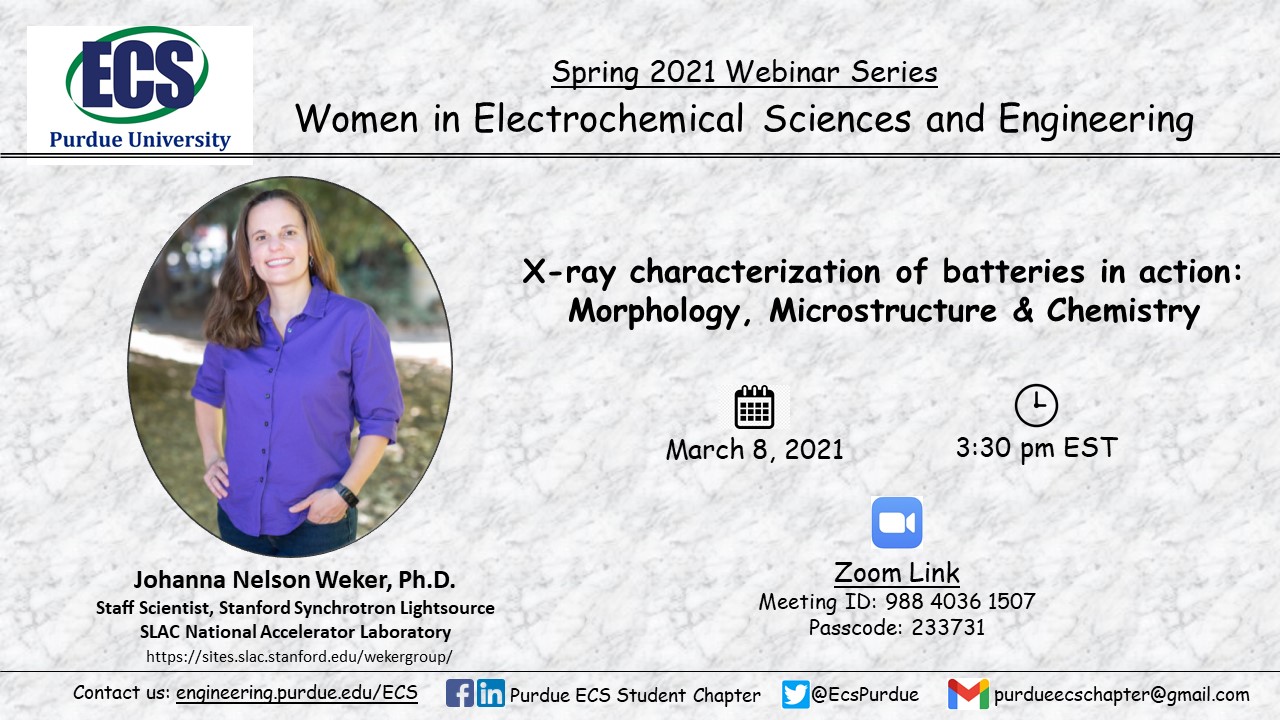
Dr. Nav Nihdi Rajput's talk on 02/22/2021
Following the webinar series,
Dr. Nav Nihdi Rajput from Stony Brook University gave a talk on "Material Informatics
for Next-Gen Batteries". Dr. Rajput talked about materials informatics for next-generation
energy storage. The presentation was based on the necessity of clean energy to reduce the
impact of climate change. Dr. Rajput expressed her thoughts about going beyond the Li-ion
front and focusing on 4 different ways to store energy: Double Layer Capacitor, Intercalation,
Deposition/Dissolution, and Redox Flow.

Dr. Kelsey Hatzell's talk on 02/15/2021
Next in the webinar series,
we had Dr. Kelsey Hatzell discussing "Engineering Interfaces and Interphases for
all Solid-State Batteries". Dr. Hatzell talked about the formation of unstable
interphases which lead to low cycle life and poor power performance. Her team
characterized the buried interface using a suite of in-situ imaging techniques to
track transformations at the Na-metal interface. She finished the talk with a very
inspiring message: "Surround yourself with people who believe you can do it when you
think you can't".
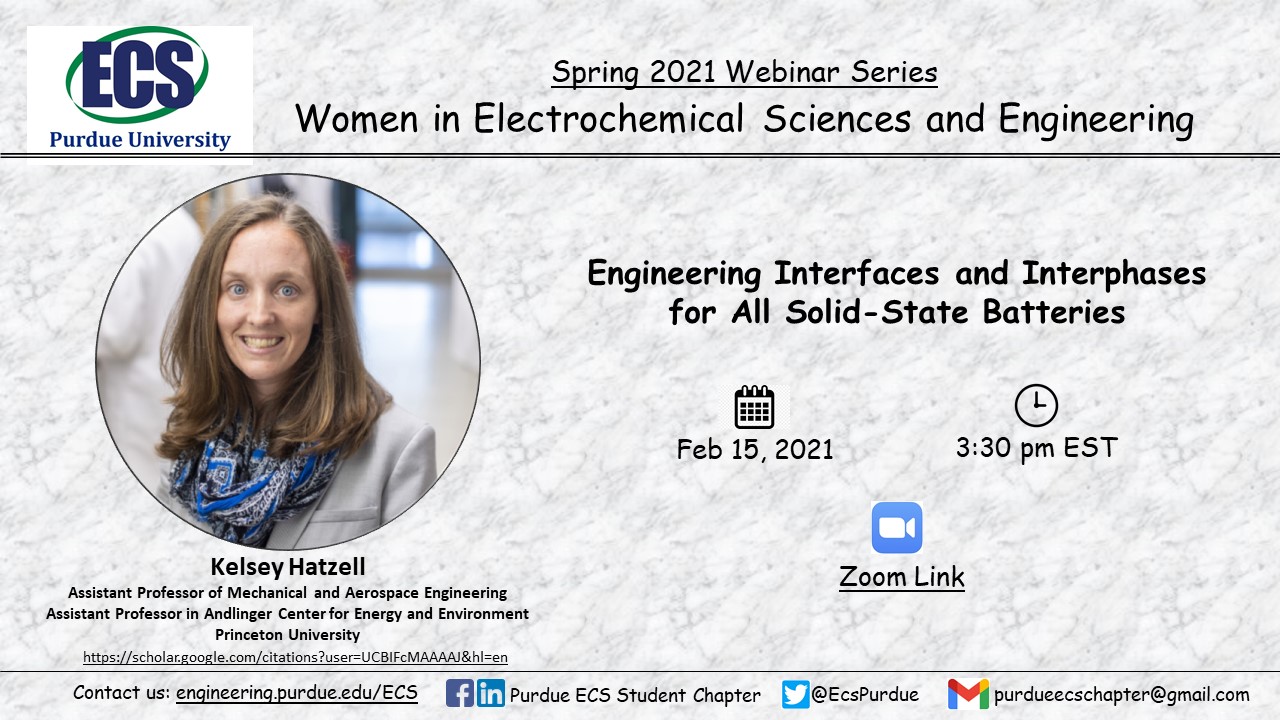
Dr. Rachel E. Carter's talk on 02/08/2021
The Spring 2021,
Women in Electrochemical Sciences and Engineering webinar series kicks
off with a talk presented by Dr. Rachel E. Carter from the US Naval
Research Laboratory, titled "Enabling Ambient Sulfur Battery Systems
through in-situ Optical Microscopy". Dr. Carter explained polysulfide anion
interaction with the electrolyte solvent by using novel pump/probe, ultrafast
lasing to observe transient signals indicative of chemical recombination.
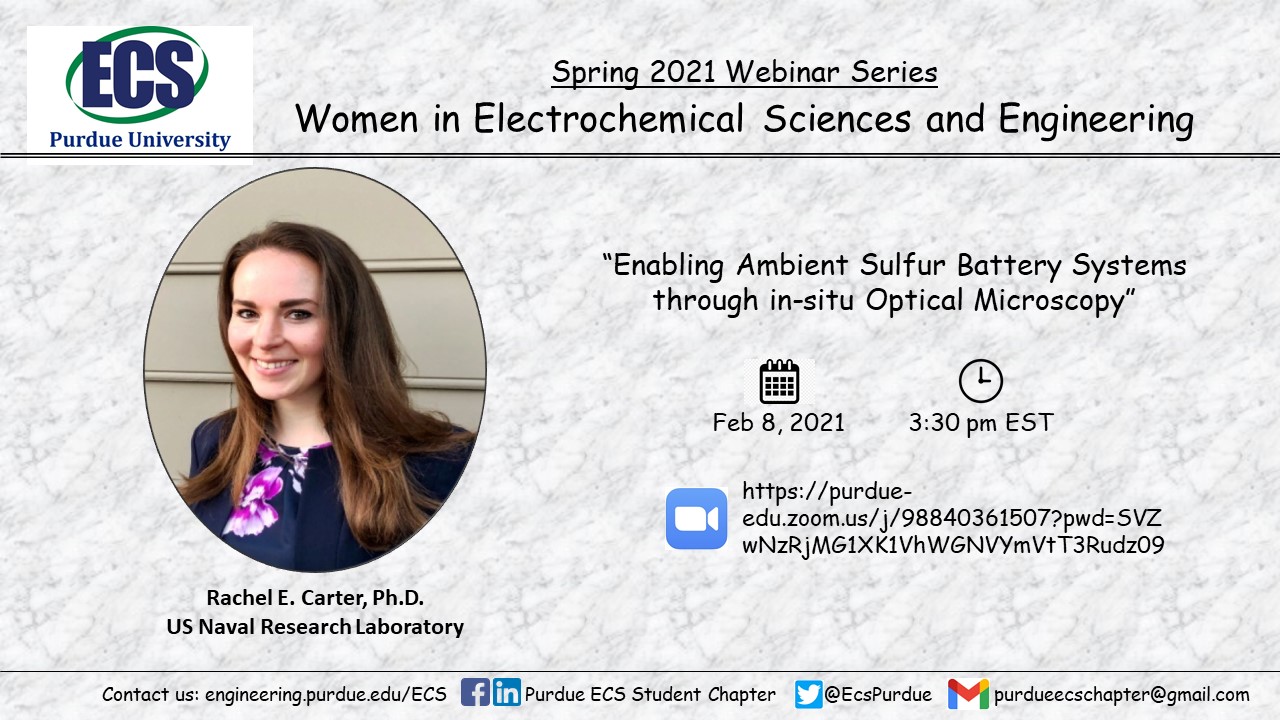
Dr. Ryan Kohlmeyer's talk on 12/14/2020
The
webinar series was concluded with the final lecture presented by Dr.
Ryan Kohlmeyer from Xerion Advanced Battery Corp / Air Force Research
Laboratory and through his talk titled "Exploring Routes to Enable Next
Generation, Safer & High-Temperature Li-ion Batteries", he
enlightened about a novel, thermally stable separator that can be
employed to extend the operational temperature window of lithium-ion
battery systems.
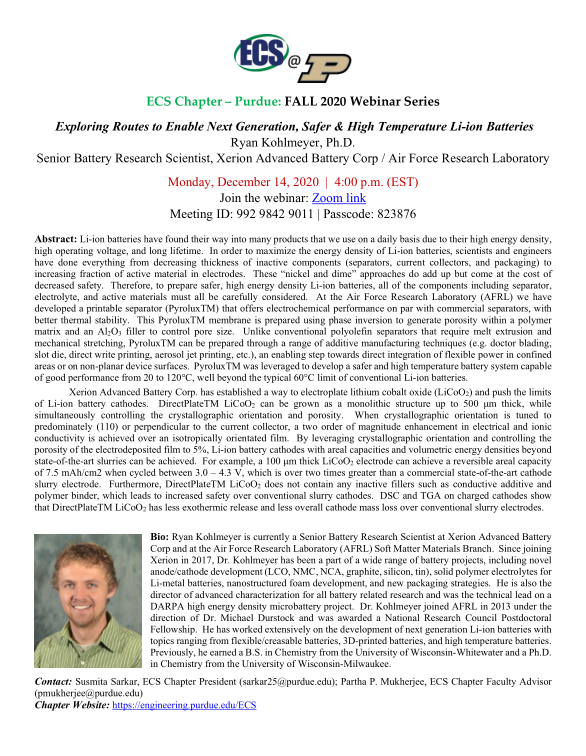
Prof. Hongyi Xu's talk on 12/07/2020
The
eight-speaker, Dr. Hongyi Xu from the University of Connecticut in his
talk on "Computational Modeling of Battery Separator Microstructure by
Statistical Characterization and Stochastic Reconstruction" explained
innovative virtual reconstruction techniques applicable to different
material systems and how those can be leveraged to compute
microstructural properties of interest.
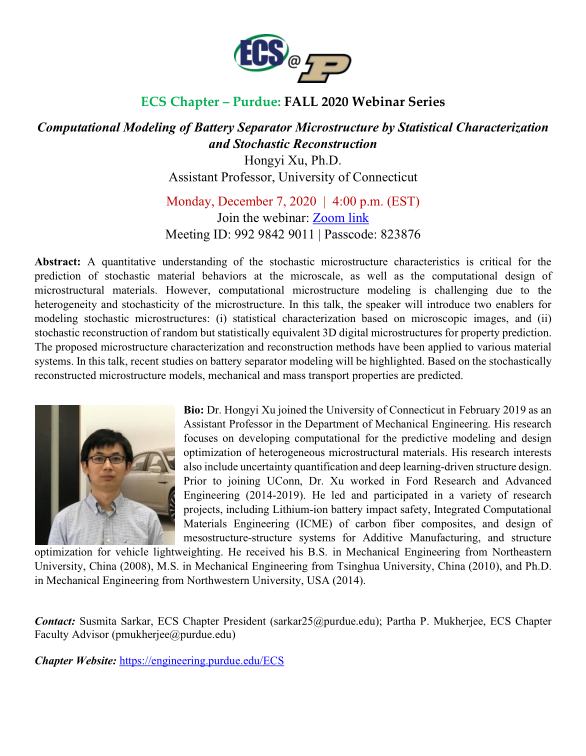
Dr. Kyle Crompton's talk on 11/23/2020
Our
seventh speaker was Dr. Kyle Crompton from Naval Surface Warfare
Center, Crane Division. In his lecture on "Inactive and Active Safety
of Lithium-ion Batteries", he highlighted thermal runaway events of
battery systems and relevant destructive testing methods.
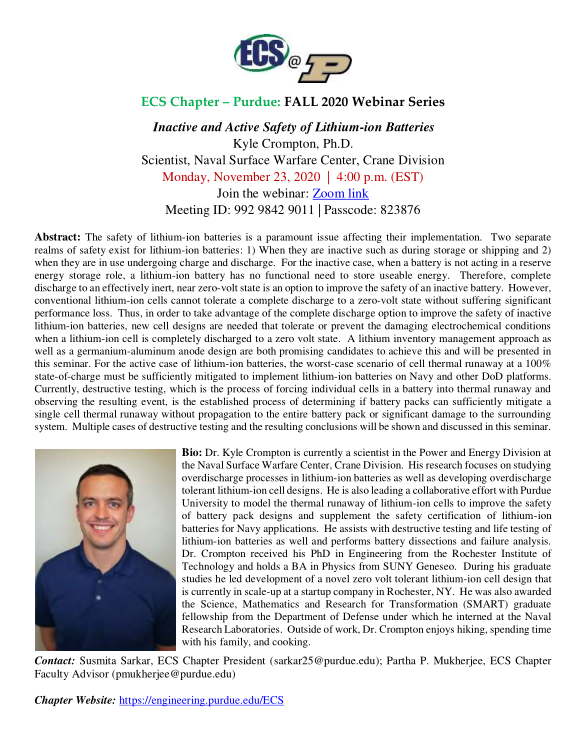
Dr. Pallab Barai's talk on 11/16/2020
Our sixth speaker was Dr. Pallab Barai from Argonne National Laboratory
presented a talk on "Understanding Lithium Deposition and Dendrite
Growth in LLZO Solid Electrolytes". He elucidated the dendrite growth
mechanism in LLZO electrolytes through a mesoscale modeling perspective
and shed light on possible strategies to suppress the same.
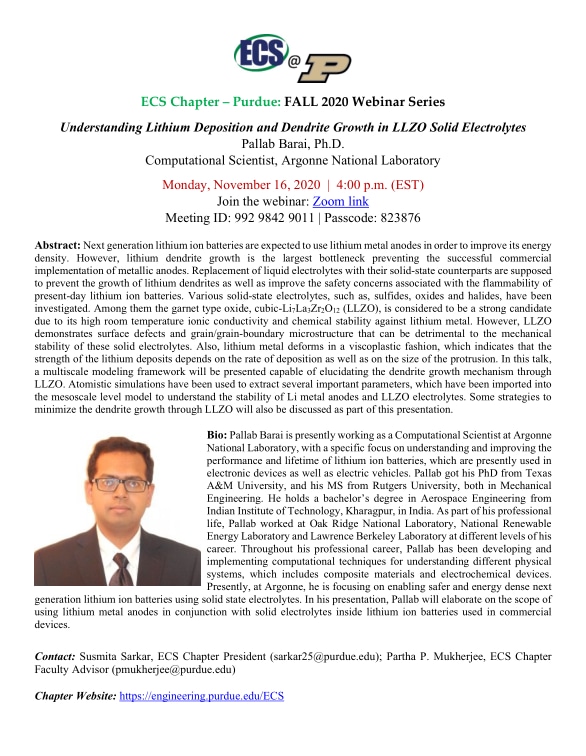
Dr. Corey T. Love's talk on 11/09/2020
The
fifth speaker in this series was Dr. Corey T. Love from the U.S. Naval
Research Laboratory who delivered a talk on the topic "Small Thermal
Gradients Can Lead to Big Changes in Electrochemical Performance &
Safety of Li-ion Batteries". He spoke at length on how the
electrochemical response of battery systems change when a thermal
gradient is subjected across the electrodes.
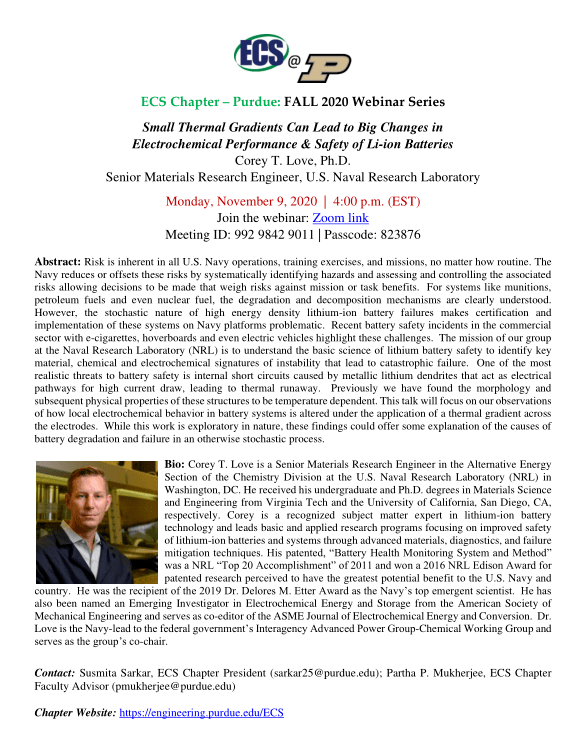
Dr. Chien-Fan Chen's talk on 11/02/2020
The fourth talk is the series was on "ESS Lithium-ion Battery Modeling and
Applications" by Dr. Chien-Fan Chen from Enphase Energy who discussed
design principles related to battery modeling from the cell/ module
level to the system level.

Dr. Judy Jeevarajan's talk on 10/26/2020
The
third speaker, Dr. Judy Jeevarajan from Underwriters Laboratories in
her talk "Application-oriented Research and its Relevance to Standards
in Batteries" demonstrated the myriad safety hazards stemming from
battery applications and provided critical insights about adopting
suitable safety standards.
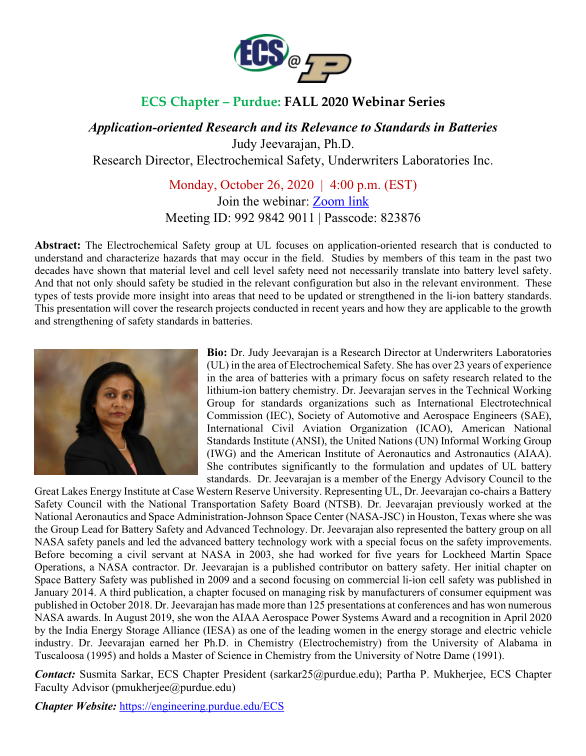
Prof. Rebecca Ciez's talk on 10/19/2020
In the second talk we saw Dr. Rebecca Ciez, Department of Mechanical
Engineering, Purdue University highlighting the thermo-economic
analysis associated with the usage of energy storage systems for carbon
footprint reduction in her talk titled "Energy storage for
decarbonization goals".

Prof. Siddhartha Das's talk on 10/12/2020
The
inaugural speaker for the weekly webinar series was Dr. Siddhartha Das
from the Department of Mechanical Engineering, the University of
Maryland who talked on "Ionics and Liquid Transport at
Polyelectrolyte-Brush-Functionalized Interfaces". He elaborated on the
combined interactions of the structure, ionics, and liquid transport at
the Polyelectrolyte-brush-grafted interface that was investigated
through all-atom Molecular Dynamics simulations.
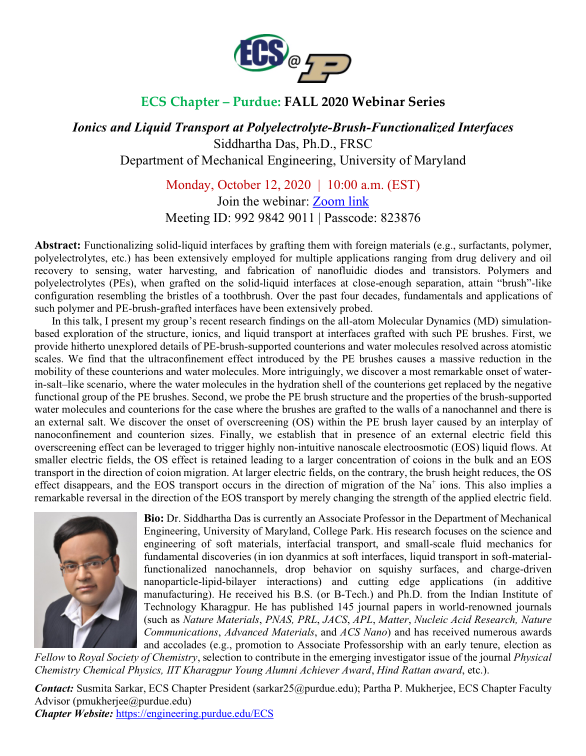
Student discussion
A
general meeting was held on Mar 13th, 2020 at 4:00 PM at Mechanical
Engineering Building 1006. Discussions were primarily focused on the
activities/events which are to be held during Summer and Fall semester.
Prof. Ramani's visit to Purdue
Professor
Vijay Ramani from the Department of Energy, Environmental &
Chemical Engineering at Washington University had visited Purdue on
01/17/2020. He gave a lecture on "Advance Materials for Electrochemical
Energy Conversion Storage".
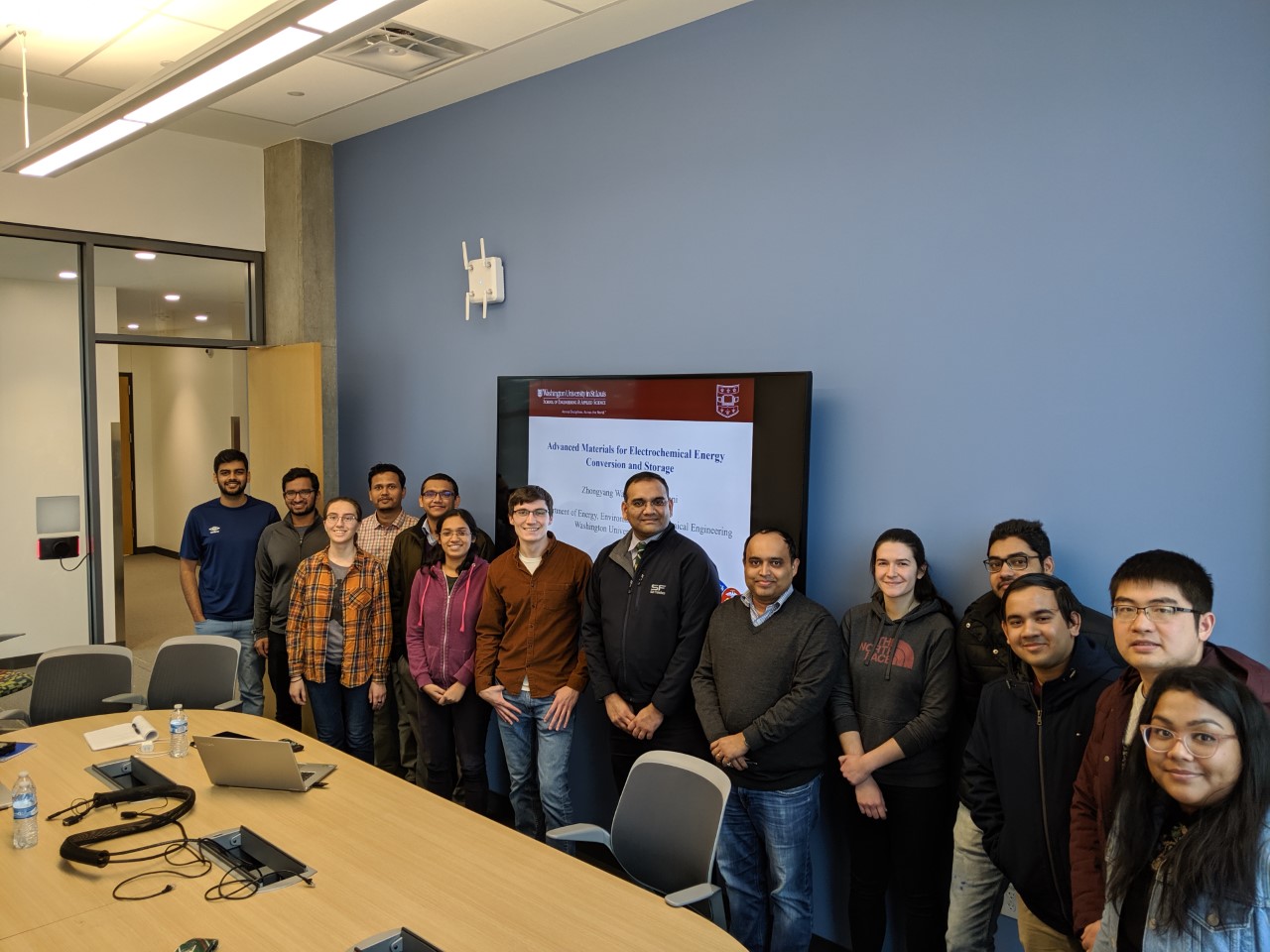
.jpg)
.jpg)


























